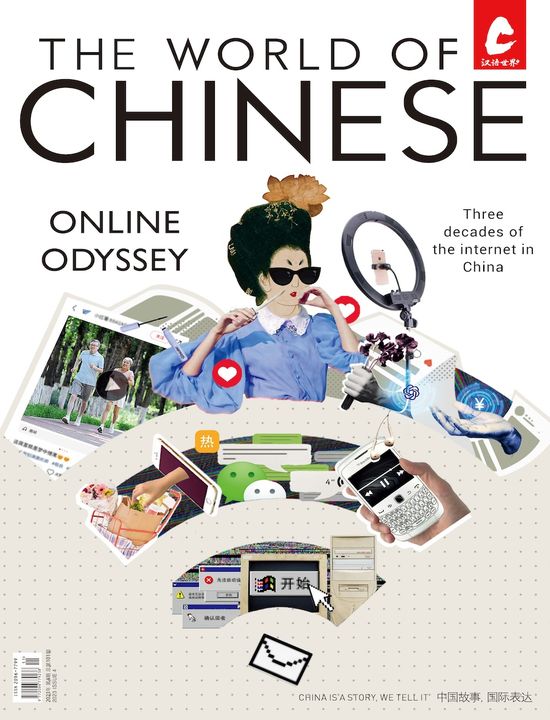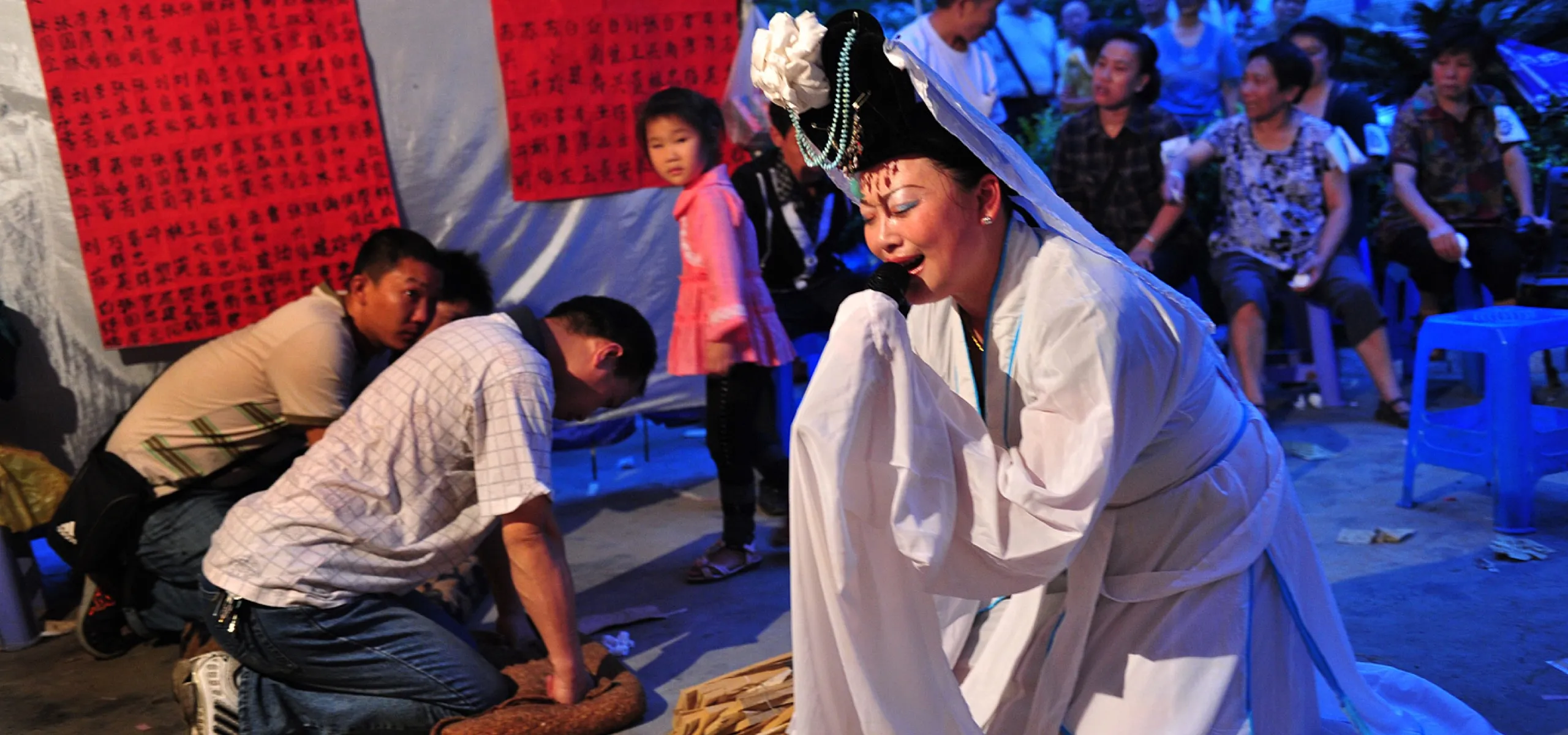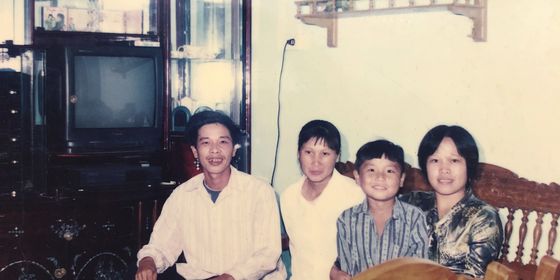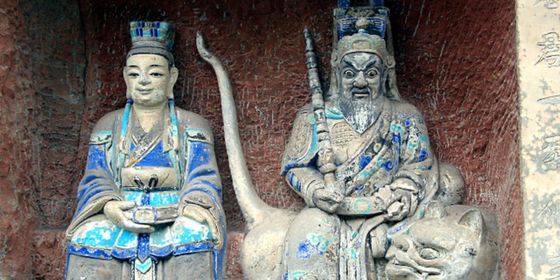How a professional mourner has spent 40 years helping families grieve for their deceased loved ones
Kusang—consisting of the characters for “cry (哭)” and “bereavement (丧)”—is a type of formal mourning and one of the Confucian rites, originating from the Rites of Zhou. It is a distinctive funerary tradition, channeling grief at a loved one’s departure through crying and honoring their life achievements through song. According to folk customs, if their loved ones’ journey to the afterlife is not accompanied by sufficient cries of mourning, the family would be viewed as unfilial by fellow villagers.
In order to avoid the embarrassment of a tearless funeral, family members of the deceased sometimes hire people to mourn in their place. From this, the unusual occupation of professional mourner, or kusangpo (“mourning lady”), was born.
-1-
The first time I met a professional mourner was at my grandmother’s funeral 16 years ago.
My family lived on the lower reaches of the Yangtze River, on the southern bank. The soil under our feet had been built up by the river’s silt. After the 1920s, peasants from Nantong, Haimen, Rugao, Chongming, Jingjiang, and other inland areas south of the river, who lost their land or had little, began migrating here out of desperation. They bought land and settled down to start families. My grandfather was one of these peasants.
This new world came to be known as Shashang, or “on the sand,” and the new residents of the region were known as “people on the sand.” Over the past hundred years, cultural exchange gradually produced customs particular to the region. These funerary customs incorporated elements from both north and south of the river.
According to local customs, there is usually a mourning period of five days after an elderly person dies. There are also those who mourn for three or seven days, depending on the time of death, funeral date, and the bereaved family’s circumstances. After my grandmother’s death, there was a five-day mourning period. Each day there were 20 or 30 tables set up for a banquet, with dishes constantly being served up and taken away as guests came and went. Expenses aside, it was an exhausting process for her family: from sunrise to sundown, there were greetings and farewells, kneeling and kowtowing.
The night before my grandmother’s funeral, our relatives and neighbors all came to hold a vigil. Everyone said Grandma had lived a hard life. It was true; she was married off to my grandfather when she was 19, becoming stepmother to my father and his older sister. When she was 40, my grandfather died of a sudden stroke, and she became a widow. She spent the rest of her life all alone in the world, gritting her teeth, raising each child to adulthood, and helping them start families.
At my aunts’ request, the funeral coordinator hired a mourning lady. At the time, this custom was just emerging in our area. It made the services seem more grand, which attracted more people to attend.
The mourning lady had the surname Chen, and she lived in a small town about 15 kilometers from my home. She appeared to be in her mid-40s, with a broad face and a wide mouth. From her pale yellow coat, navy pants, and mud-streaked boots, I guessed that she was an ordinary village woman who spent most of her days working in the fields. Being a mourner would have been a side gig, a way to make some extra money for household expenses.
Holding a white towel like a prop, Ms. Chen got a little stool and sat down in front of my grandmother’s coffin, with her back hunched and head lowered. She shifted her gaze around the room, doing her best not to look at anyone. There was a clear sense of inferiority, because in those days mourning was a disreputable job. If not forced by economic circumstances, few people would do it.
She had done some homework before coming, and had a rough understanding of my grandmother’s life. The younger generations came one by one to pay for her services—between 10 and 30 yuan—and ask her to cry for them for a few minutes, as if choosing a song in karaoke. She kept track, crying in the character of whoever paid her. Sometimes she mourned with tears and sometimes without, depending on how deeply she inhabited her role.
When it was my turn to have her cry, she sat in thought for two or three minutes. Then she started swaying, slashing the towel back and forth through the air. Her face became a mask of grief, and she opened her mouth: “Grandmother, my dear grandmother! You suffered your whole life; your suffering as deep as the ocean! You toiled your whole life; toil as heavy as the mountains! Just as you came to the end of your hardships, as the light of prosperity dawned, you departed without a sound! My dear grandmother! Your kindness to your grandson will not be forgotten! When there was candy, you saved it for your grandson; when there were cakes, you saved them for your grandson; when there was meat, you saved it for your grandson. Now your grandson is a credit to you! What you want to eat, you will eat! What you want to drink, you will drink! You left without warning; how can your grandson repay you? I weep and I shout, but even if your grandson’s tears run dry, you won’t return; even a thousand shouts won’t bring a reply!”
Ms. Chen’s wailing rose and fell in mournful tones. Her mourning was plainspoken and warm, the local dialect mingling with her shoddy Mandarin. We all understood, we all grieved. The sorrow rose within me before I knew it, and my tears came flowing down.
That night, Ms. Chen took more than 20 orders, spending an average of 7 or 8 minutes on each. In about two hours, she exchanged her tears, her emotions, and her now-hoarse voice for about 300 yuan.
When she left, she looked indifferent and a bit tired, but there was a spring in her step.
-2-
Since then, I have seen seven or eight other mourning ladies at funerals for elderly villagers who had passed. These mourners were similar to Ms. Chen; although they sometimes shed genuine tears, most of it was a performance. With their low standard of professionalism, they didn’t leave much of an impression on me.
Until two years ago, when a distant relative—an older male cousin—passed away at 68. At his funeral, a mourner surnamed He bowled me over with her “professionalism.” She is unparalleled in the local industry: If she claimed to be second best, nobody would claim to be first.
The day of my cousin’s funeral, a grand ceremony was held according to local customs. At 7 in the morning, Ms. He came hobbling in with a glass of malva nut tea. A large group of people came streaming in behind her, including a “military band.” This was a folk name for a musical group of 10 to 20 people—male and female, young and old—and had nothing to do with military music. They play the suona, trombones, clarinets, saxophones, french horns, trumpets, bass and snare drums, cymbals, and other instruments.
They dressed in a motley array of military-style clothing, topped off with service caps. Their repertoire included songs such as “Namo Amitabha,” “How I Miss You,” “Farewell,” “It’s Hard to Say Goodbye,” and “Nothing so Great as a Mother,” to bring out the sentimental atmosphere of the funeral. Aside from this, they helped with miscellaneous tasks, putting up tents and carrying the casket.
After handling some details with the bereaved family, Ms. He began preparing for the funeral in earnest.
Ms. He was in her early 60s, with hair an exaggerated shade of black that was clearly dyed. Three or four locks floated in front of her forehead. Her complexion was on the darker side, her cheekbones were high, and the bridge of her nose was flat. The corners of her mouth hooked upward, and a pair of ostentatious gold earrings dangled from her ears. She was stocky, neither tall nor short, and wore a short, purplish-blue checked coat. Aside from her impaired leg and the deeper creases on her face, the primary characteristic distinguishing her from village women her age was her set of steely triangular eyes. These made her look a bit like a witch in a fairy tale.
I saw “Grandma He’s Funeral Services, LLC” printed on the refrigerated casket; she appeared to be the actual owner of the company.
Her business provides comprehensive funeral and interment services, including set-up and decoration, burial clothes and funeral articles, officiating, music, refrigerated caskets, and hearse rental. The rates are set based on the services provided, duration, and level, with a service menu for bereaved households to choose from. It is split into three tiers: premium, mid-range, and value. Not including food and alcohol, the most expensive tier is priced around 40,000 yuan, the mid-range around 30,000 yuan, and the budget tier between 10,000 and 15,000 yuan. Thanks to the fair prices and attentive service, the company enjoyed a good reputation. It had become a leader in the local industry, doing brisk business and receiving favorable attention.
“Granny, you’ve been working hard all morning, you must be exhausted—why don’t you rest for a bit?” My cousin’s daughter saw the sweat beading up on Ms. He’s face and patted her shoulder. She had selected the mid-range package.
“No, no, it’s nothing, I must follow procedure, there’s no room for error,” Ms. He replied loudly.
My cousin’s son-in-law rose and said, “As long as it looks passable, that’s fine; we wouldn’t blame you for anything.”
“How could I do that? I can’t be sloppy with the details.”
Ms. He lifted her head and smiled at the son-in-law. Then she went right back to work.
-3-
At 8 o’clock, with the preparations complete and the deceased’s family and friends mostly arrived, the band started up an overture and the funeral began. Throughout the ceremony, Ms. He pulled double duty as both officiant and mourner.
Taking up the microphone, she cleared her throat, smoothed her clothes, and limped toward the center of the space. Her back to the mourning hall, she swept her eyes from left to right, scanning the space. When her chilly gaze flashed over the crowd, everyone fell silent. After admonishing against guests laughing, answering the phone, and walking about, she announced the beginning of the ceremony.
A loud, drawn-out cry descended from the sky like thunder: “Ai ya ya, my dear father, ah, ah, ah…Water has its source and trees have their roots; in this world only my father is dear to me. You raised your daughters to adulthood; they do not forget your kindness. You had me at 28; now almost 40 years have flashed by. Having me, you were like a heart in bloom; having me, you were like an immortal come to earth; having me, you were like gold forming in the ground. You took me as your heart and cherished me, you took me as your treasure and shielded me, you took me as your kite and sent me skyward…In life, you raised accomplished daughters; now, the cold pines gather dew and weep. Your daughter cries her heart out, for her father has left this world. King Yama is loath to let souls go; they wend their way to the Yellow Springs...”
Immersed in her mourning, Ms. He sang and cried, stood and knelt. Her expressions and postures were just like the ones in Chinese opera. With the voice and bearing of the deceased’s daughter, she grieved for the totality of his life, his achievements and acts, including his time of birth, his bitter early experiences, his childhood suffering, his youthful ordeals, the strivings of his prime and the vicissitudes of his working life, not to mention every aspect of his love and care for his family…All of these minute details were burnished like family treasures in her recollection, framed out and brought to life. Whether old or young, male or female, tearful or restrained, familiar or distant, each and every person in the audience wept in silence, deeply affected.
I think there are three reasons why Ms. He could mourn to such effect:
The first is that she understood the ordinary experience. The episodes she mourned from the deceased’s life were the stuff of daily life, the trivial matters. Listeners with some life experience could empathize, as if those things were happening to themselves. This was a potent weapon, leading others to cry their own tears for another person’s story.
The second was her voice. She had a naturally good voice, with ample volume and range, and a beautiful timbre. During the entirety of the mourning, her voice flowed from relaxed to rushed, high to low, melancholy to melodious. She transitioned between them constantly and with ease. Now she would cast out a high note, like a steel wire flung toward the horizon; now she would drop into the valleys, like a murmuring brook. In that compressed span, her vocal twists and turns covered vast ground.
Then, all of a sudden, her voice got lower and lower, softer and softer, almost to the point of inaudibility.
The audience held its breath. After about a minute of silence, a thread of sound seemed to emerge from the ground. As it emerged, it sprang alive like a firework arcing skyward, like a flock of twittering birds, like raindrops on lotus leaves…I couldn’t help but exclaim—a master is here among us, this woman’s mourning is incredible! It’s a pity that such a lovely voice had to be used for crying; if she had studied storytelling or opera, she would undoubtedly be winning prizes.
The third thing was her literary talent. Her enunciation was clear, her rhetoric sound, and her phrasing meaningful. The sentences that rushed from her like a whirlwind were neatly juxtaposed, full of rhyme and cadence. Not only this, but she managed to flawlessly incorporate the names of the deceased’s relatives, the terminology specific to his illness, even the names of his medications and the jargon from his profession in life. If she hadn’t done exhaustive preparation beforehand, how could she have reached such heights? Her diligence was admirable.
Ms. He’s mourning lasted about an hour and 20 minutes. During that time, she told of all the hardships of the deceased and expressed all the yearnings of the living. This was the focal point of the whole funeral. I’ll call this first chapter the “Ode to Rites.”
-4-
After a five-minute rest, she started right in on the next chapter: “Veneration and Blessings.”
This chapter took the form of call and response. Accompanied by the band, Ms. He bobbed her head and swayed, singing: “Today I leave this mortal world and ascend to paradise; from the heavens I think of earth and bless all with good health. The first blessing: May our elders live longer than the Zhongnan Mountains! Namo Amitabha.”
Everyone answered, “May our elders live longer than the Zhongnan Mountains! Namo Amitabha.”
“Today I leave this mortal world and ascend to paradise; from the heavens I think of earth and bless all with good health. The second blessing: May our neighbors enjoy good health and success in all things! Namo Amitabha.”
Everyone answered, “May our neighbors enjoy good health and success in all things! Namo Amitabha.”
It went on like this, from elders to neighbors, from neighbors to friends, from friends to colleagues, from colleagues to relatives, and so forth…it wasn’t until the tenth blessing, after the assembled friends and relatives had paid their respects, that this section came to an end. There was musical accompaniment throughout, and more warmth amid the solemnity than in the previous chapter.
Soon after, the third chapter began: “Eternal Farewell.”
Ms. He continued to officiate. After another spell of music from the band, the deceased’s only daughter delivered the eulogy. When this was over, the band struck up a mournful tune. Everyone lined up in orderly fashion, approaching the deceased’s coffin and prostrating themselves in turn. They then walked in a circle around the remains once to express their reluctance at parting. Finally, the daughter and son-in-law of the deceased knelt in a final tribute.
The three chapters of the funeral lasted about two and a half hours. Afterwards, the friends and family who were sending the deceased off to the crematorium first took had lunch together, along with Ms. He and the band members. As the dishes were served and the wine flowed, the aromas permeated the space, diluting the sorrow of the morning and lifting the atmosphere.
Seeing that it was time, Ms. He called the deceased’s family over to pay their last respects. After that, they gathered up the hanging scrolls and exited the funeral hall. Amid the reports of a parting gun salute, several male members of the band lifted the coffin into the hearse. Those accompanying the deceased on his final journey filed onto the bus, and the fleet embarked on its way to the deceased’s last stop.
—
Having participated in the whole funeral and gotten a taste of Ms. He’s talents, I gained a deep interest in the mourning industry. On the way back from the funeral parlor, I purposefully got on the same minibus as her and the band.
“Grandma He, you’ve worked hard, you’ve all worked hard!” I tried to strike up a friendly conversation. She gave no response, only turning her head with a faint smile. After hearing the others chat with me, she responded loudly, “Hard? The work isn’t hard, life is hard!”
We started talking after that. At the funeral dinner that night, I filled my cup with wine and squeezed in with Ms. He and the others at their table once again.
“The work isn’t hard, life is hard!” That phrase kept flashing through my mind. Through conversation with Ms. He and her colleagues, I gleaned rare insights into this woman’s remarkable life.
-5-
Ms. He was born into an ordinary peasant family, who desperately wanted a son to carry on the family name. But their wishes went unfulfilled: They had five children in succession, all girls. Even as their hopes were dashed again and again, her parents refused to give up. They prayed to all manner of deities and consulted numerous doctors, all in hopes of having a son.
After Ms. He’s mother became pregnant for the sixth time, the fortune-teller she hired swore that if it wasn’t a boy this time, he’d write his name upside down.
And as dusk fell one winter night, Ms. He’s parents welcomed their “son” into the world. Brimming with expectation, they pried the newborn’s legs apart and looked: Not only did the infant not come with the right parts, but one leg was also clearly thinner and shorter than the other. Her parents were angry enough to spit blood. In their despair, they threw aside their infant daughter and left her to cry, neither feeding nor swaddling her. By the next morning, when she had no breath left in her, they cruelly tossed her into the chamber pot. Ms. He’s grandmother took the pot to the latrine and was just about to tip out the contents when she saw the infant twist her body and struggle to wave her tiny, bluish hands at the sky.
“Merciful Buddha!” It was still a human life, after all. Muttering, Ms. He’s grandmother picked up the infant girl, pulled her into her bosom, and brought her into the house to warm her up. Some time later, the infant let out a cat-like cry. Her grandmother rushed to wrap her up, and then fed her rice porridge.
“Can you even raise it? And what use would it be if you did? Better to let it die!” Ms. He’s father threw out these cruel words when he saw what she’d done. Her grandmother retorted, “If you don’t raise the child, I will!”
The baby had a strong will, and survived. Her grandmother, who knew only a handful of characters, named her He Lianmei, “poor younger sister.” This was her formal name.
Separated from her parents at birth, the unfortunate He Lianmei grew up with her grandmother. The years passed and she grew up. Heaven was kind, and though He Lianmei didn’t finish elementary school, she grew up smart and sensible, with an uncommon sense of tenacity.
In 1979, when He Lianmei was 19, the grandmother who raised her passed away at 76. At her funeral, He Lianmei couldn’t contain her grief. She mourned her grandmother’s life history and the bitter hardship the old woman bore in raising her granddaughter, and every detail of her loving care. She cried her heart out, bringing everyone to tears and instilling a new level of respect in their eyes. They’d never thought this child could feel so much, mourn so deeply—it was a talent that held promise for her future.
About six months after her grandmother died, a bricklayer from He Lianmei’s village fell while putting up a chimney and died on the spot. He was only in his 30s. Faced with this sudden tragedy, the bricklayer’s wife fainted from shock and had to be hospitalized. At his funeral, his young daughters knelt, dazed and silent. The villagers who helped organize his service got anxious: “Come on, why don’t you cry? Even crying a little is better than nothing…”
The two children didn’t have a concept of life and death yet. No matter how the adults pleaded, they wouldn’t cry. In a moment of desperation, the officiant pulled He Lianmei from the crowd and had her mourn in their place. She glanced at those two pitiful children and her heart turned over. Soon, her face was streaked with tears and her wailing shook the heavens. The atmosphere of grief reached its climax, bringing solace to the deceased.
What the onlookers didn’t know was that, confronted with the two young daughters of the deceased, and dealing with the recent loss of her own grandmother, she couldn’t hold back her genuine grief. In their eyes, He Lianmei had simply once again demonstrated her fortitude through her remarkable performance.
Several days later, the leader of a “military band” came knocking on her door, asking her to join.
—
Should she join the band? It was a hard decision at the time.
She knew that professional mourners had once existed in society, but those who made their living this way had usually exhausted all other options. After the Revolution in 1949, professional mourning had more or less ceased to exist. When the bricklayer passed away, she had mourned on behalf of his daughters to help out. To make this her actual livelihood might invite ridicule or make her less attractive for marriage. Would it dishonor her ancestors, make it hard for her to stand on equal footing with others? He Lianmei tossed and turned, unable to sleep.
She pondered for three days and three nights. She considered that she was alone in the world, with her grandmother gone and no love lost between her and her parents. She considered her disabled leg, how she struggled in the fields and would have a hard time finding work. In the end, she made her decision: She said she’d try it out.
This response made her the first professional mourner in the region since before the Revolution. Once there was the first, soon came the second and the third. Thereafter, the number of local mourners gradually increased, peaking at around 30.
-6-
He Lianmei followed the band from village to village, house to house, taking up the role of the “mourning lady.” Through continuous study and practice, she gained the ability to improvise mourning songs to popular tunes and opera music.
Despite this, business was worse than anticipated when they started out. Demand was inconsistent: she’d mourn two or three times a month, scraping by on 60 to 70 yuan. This continued until the early 90s, when business surged overnight. More and more bereaved households started inviting He Lianmei to mourn on their behalf.
Every time she received a commission, He Lianmei would charge 50 to 100 yuan depending on the circumstances of the bereaved family. This added up to 10,000 to 20,000 yuan a year—ten times more than a farmer’s salary, and five times more than an artisan’s.
Even though she made good money, the discriminatory attitudes persisted. After all her hard work, after crying her throat raw, she was often repaid with disdain and contempt. She felt inferior.
Having saved up enough money, she knocked down the single-story house her grandmother left behind and replaced it with a two-story building. Riches begat more riches: When she was 31, after pulling some strings, she married a widower in his 40s. She gave birth to a healthy son the next year, the start of a happy family. Seeing her reap these rewards, the parents and five older sisters who once turned their backs on her fell over themselves to make up and regain her favor. He Lianmei didn’t hold anything against them. She was never stingy when her parents fell sick and had to be hospitalized or when her sisters’ families urgently needed money. She shelled out hundreds and thousands of yuan without a single complaint.
Her husband, an honest man, let her have her way. After all, she had earned that money with her own tears. Seeing all this, their fellow villagers praised He Lianmei for her generosity and kindness.
With the turn of the century, the funeral services industry entered a golden age, developing its own industrial chain. More and more practitioners entered the field, business flourished, and incomes rose. People like He Lianmei could now stand tall, and others started looking at them differently, with obvious envy.
—
He Lianmei has already been in business as a mourner for 40 years.
Twelve years ago, the leader of the band fell ill and passed away. Afraid that the group would disband, He Lianmei took responsibility for the band, leading this ragtag group of undistinguished musicians who had families to feed. They busied themselves with an endless procession of funerals, sending off countless deceased. Resilient as weeds, they bore the wind and rain, taking whatever life sent their way.
Two years later, she expanded the scope of her business, turning the band into “Grandma He’s Funeral Services, LLC.” She registered with the commerce bureau and became a legal business owner. Under her painstaking management, the company took off and business flourished. It has continued expanding, now with four subsidiaries under the main company. Not only has this provided employment to almost a hundred people, it has given them fresh prospects. Ms. He has also earned a substantial amount, making 400,000 yuan a year.
While her pockets have expanded, Ms. He’s one-stop funeral service hasn’t been all about profit. When she encounters a family in need, she will often waive part of her fees out of compassion. As part of the Disabled Persons Federation, she has also registered a charity that puts 30,000 yuan a year toward granting small wishes from people with disabilities. This is one of the things that has given her a good reputation.
—
The night of my distant cousin’s funeral, the banquet carried a sense of gratitude toward Ms. He and the band. The atmosphere was free and relaxed.
“Grandma He, another toast to you!”
“Alright!”
After a hard day’s work, amid the alcohol-soaked camaraderie, Ms. He seemed to be in good spirits. A few glasses of red wine down the hatch, her face was flushed. When I asked her whether she has arranged for someone to take over the business, she looked pensive. Then she laughed, “I’ll work until I can’t. I don’t think so much about the future, whoever wants to do it can do it.”
After dinner, as I watched her retreating figure, dissonant thoughts swirled within me. Despite facing her share of adversity, she has cried her way to a comfortable life. Whatever you think of her values, she has had quite the life story.
(Names of people were changed to protect the identity of the subjects)
— Ding Dong (丁东)














